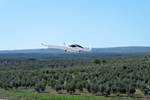Lilium engages Aernnova to design and build the Lilium Jet’s propulsion mounting system
Aernnova and Lilium will collaborate on the design, manufacture and delivery of the key composite aerostructure component.
Lilium N.V. (Munich, Germany) developer of the all-electric vertical takeoff and landing (eVTOL) aircraft, the Lilium Jet, has selected aerospace component manufacturer Aernnova (Miñano Mayor, Spain) to collaborate on the Lilium Jet’s propulsion mounting system, including its design, manufacture and delivery. According to Lilium it will feature a complex design, will serve multiple functions and be modular and scalable and will incorporate lightweight materials such as carbon fiber-reinforced epoxy.
A propulsion mounting system or “flap,” the structure that forms the rear part of the wings and front aerofoils, is one of the Lilium Jet’s major components, producing lift by interacting with airflow from the engine. It also houses the propulsion and vectoring systems responsible for vertical and horizontal flight.
Electric jet engines integrated into the wing flaps provide advantages in payload, aerodynamic efficiency and a lower noise profile, while also providing thrust vector control to maneuver the Lilium Jet through every phase of flight.
“Aernnova is an industry leader for customized design and manufacture of metallic and composite assemblies, which makes them an ideal partner,” Yves Yemsi, chief operating officer (COO) of Lilium, says. “It is important to us that we collaborate with the best aerospace suppliers and leverage their expertise.”
Aernnova is reported to be one of the largest Tier 1 aerospace suppliers, providing aerostructure for companies such as Airbus, Boeing and Embraer. The collaboration represents a significant step towards serial production of the Lilium Jet and Lilium’s goal of making sustainable high-speed regional transportation a reality.
Related Content
-
Honda begins production of 2025 CR-V e:FCEV with Type 4 hydrogen tanks in U.S.
Model includes new technologies produced at Performance Manufacturing Center (PMC) in Marysville, Ohio, which is part of Honda hydrogen business strategy that includes Class 8 trucks.
-
Composites end markets: Pressure vessels (2024)
The market for pressure vessels used to store zero-emission fuels is rapidly growing, with ongoing developments and commercialization of Type 3, 4 and 5 tanks.
-
Infinite Composites: Type V tanks for space, hydrogen, automotive and more
After a decade of proving its linerless, weight-saving composite tanks with NASA and more than 30 aerospace companies, this CryoSphere pioneer is scaling for growth in commercial space and sustainable transportation on Earth.

















